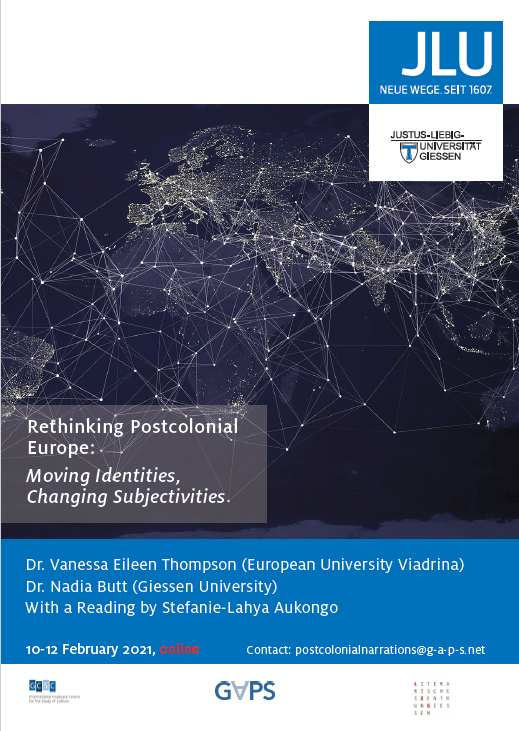
Conference Chair: Theresa Krampe
Organizing Committee: Jeannette Oholi, Nadiye Ünsal, Johanna Munzel, Nadia Butt
Registration:
***Update: REGISTRATION CLOSED***
We offer registration for a limited number of guests (students, PhD researchers, or early Postdocs) on a first come first serve basis. If you would like to register for the conference, please send us an email at postcolonialnarrations@g-a-p-s.net stating your name and, if applicable, institutional affiliation and/or interest in the conference. Please understand that, in order to prevent 'zoombombings,' we will only pass on access links to registered persons.
Call for Papers
Rethinking Postcolonial Europe: Moving Identities, Changing Subjectivities
Digital Conference, February 10-12, 2021
International Graduate Centre for the Study of Culture (GCSC)
Justus-Liebig-University, Giessen
8th postgraduate forum Postcolonial Narrations
Thinking ‘Europe’ as an idea, a geographical space, and a political force is inseparable from thinking about its history of imperialism, its postcolonial legacies, and its preoccupation with questions of in and outside, centre and periphery, the self and the other. Migration and the current so-called refugee crisis not only urge a changing perception of those power hierarchies that tend to divide the world between ‘the west’ and ‘the rest’ but also compel new discourses of national and cultural identity and belonging. The recent resurgence of populism and racism connected to the rise of right-wing parties in several European states serves as an uneasy reminder of the continuing influence of hegemonic ideas of European exceptionalism and cultural superiority. Global inequalities persist and the freedom of movement remains linked to where one comes from. At the same time, however, practices of resistance and emancipation in migrant/BPoC self-organisation reimagine Europe as an entangled space (Randeria 1999) that was and is home for different people. Received notions of nation and culture as well as identity and subjectivity have undergone a dramatic change, vividly reflected in the domains of art, literature, media, law, and politics. Investigating these current dynamics from a post-/decolonial perspective is thus crucial to understanding contemporary Europe as a contradictory space and a contested place.
Exploring Europe from a post-/decolonial perspective, the conference lays emphasis on rethinking Europe and its borders to generate a discussion about ‘travelling cultures’ (Clifford 1992), diasporic and migrant communities, hybrid identities, changing subjectivities, cultural translations (Bachmann-Medick 2012), transnational and transcultural relations, neo/cosmopolitanism, or neo-nomadism (Dagnino 2013), to name but a few. In our world on the move, it becomes increasingly conspicuous that people, ideas, cultures, or resources cannot be understood in terms of traditional, binary models of centre and periphery, South and North or East and West as “cultural conditions today are largely characterized by mixes and permeation” (Welsch 1999: 197) in the wake of transnational relations. In the 21st century, post-/decolonial studies continue to deconstruct the myths around Europe by interrogating the histories and geographies of power associated with Europe and its (colonial) legacy around the globe.
In light of the conference theme, the following questions can be addressed: How have practices of travel and mobility in the age of globalization altered traditional concepts of culture and identity? How can post/decolonial literatures, art, and practices imaginatively refigure (Gikandi 1991) Europe as a geographical space as well as an idea? Why is it important today to understand and acknowledge the role of marginalized communities in transforming the idea of Europe? How do past and present migration policies and other governmental practices shape the idea and geography of Europe, or rather of “multiple Europes” (Boatca 2013)?
We welcome papers which engage with but are not limited to the following areas of interest and research:
- New perspectives and approaches in post-/decolonial studies
- Representations of Europe and its ‘Others’ in different media
- Narratives of European identity in and beyond the EU
- Legacies of European colonialism in the 21st century
- Post-/decolonial/ Critical Migration Studies
- Afro-European Studies
- Critical Race Studies
- Memory Studies
- Narratives of Displacement
- Diaspora Studies
- Transnational and transcultural Studies
- Queer and intersectional approaches
- Political, legal, and human rights perspectives
- World Literature / World Anglophone Studies
- Tourism/Travel Media
- Performing Arts
There will also be an opportunity to present projects and work in progress in the form of a digital poster session. If you are interested in contributing, please send an abstract (300-500 words for a 15-minute presentation; 150-200 words for a poster presentation), a short biographical note and the topic of your current project, preferably as one pdf file, to postcolonialnarrations@g-a-p-s.net no later than November 15, 2020.
The present conference is organized as a digital event in cooperation with GAPS (Gesellschaft für Anglophone Postkoloniale Studien) and the GCSC (International Graduate Centre for the Study of Culture).
The Organizing Committee
Nadia Butt, Theresa Krampe, Johanna Munzel, Jeannette Oholi, Nadiye Ünsal
International Graduate Centre for the Study of Culture (GCSC)
Alter Steinbacher Weg 38
35394 Gießen
Email: postcolonialnarrations@g-a-p-s.net
Bibiliography
Bachmann-Medick, Doris. "Translation – A Concept and Model for the Study of Culture." In: Travelling Concepts for the Study of Culture, edited by Birgit Neumann and Ansgar Nu?nning. Berlin: De Gruyter, 2012, 23-43.
Boatc?, Manuela. "Multiple Europes and the Politics of Difference Within." In: The Study of Europe, edited by Hauke Brunkhorst and Gerd Grözinger. Wiesbaden: Nomos, 2010, 51-66.
Clifford, James. “Traveling Culture.” In: Cultural Studies, edited by Lawrence Gross, Cary Nelson and Paula A Treichler. New York: Routledge, 1992, 97-110.
Dagnino, Arianna. "Global Mobility, Transcultural Literature, and Multiple Modes of Modernity." The Journal of Transcultural Studies 4, no. 2 (2013): 130-160. https://doi.org/10.11588/ts.2013.2.9940.
Randeria, Shalini. "Geteilte Geschichte und verwobene Moderne." In: u.a. (Hrsg.), Zukunftsentwürfe. Ideen für eine Kultur der Veränderung, edited by Jörn Rüsen et al. Frankfurt a. M.: Campus, 1999, 87-96.
Welsch, Wolfgang. "Transculturality: The Puzzling Form of Cultures Today." In: Spaces of Culture: City – Nation – World, edited by Mike Featherstone and Scott Lash. London: Sage, 1999, 194–213.
